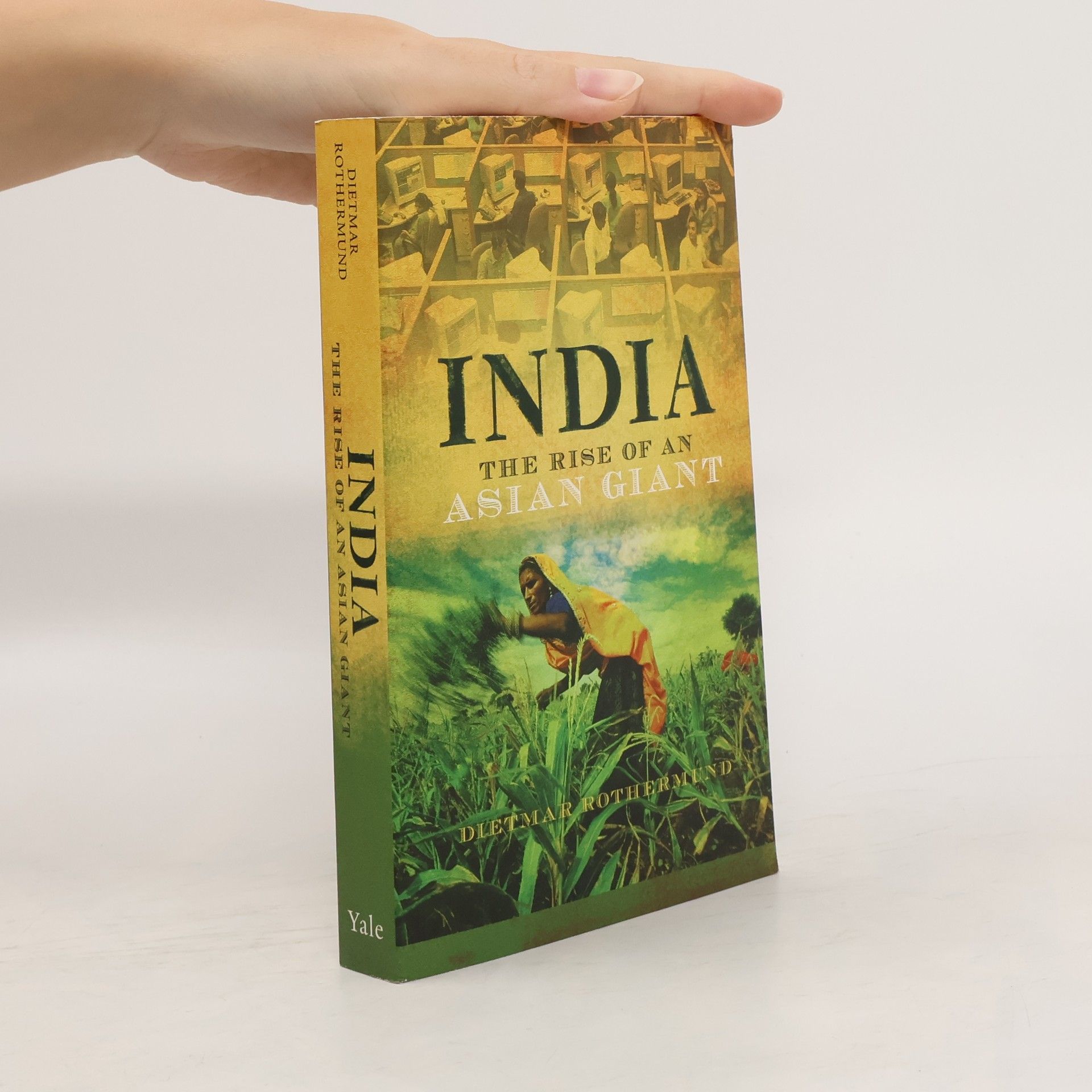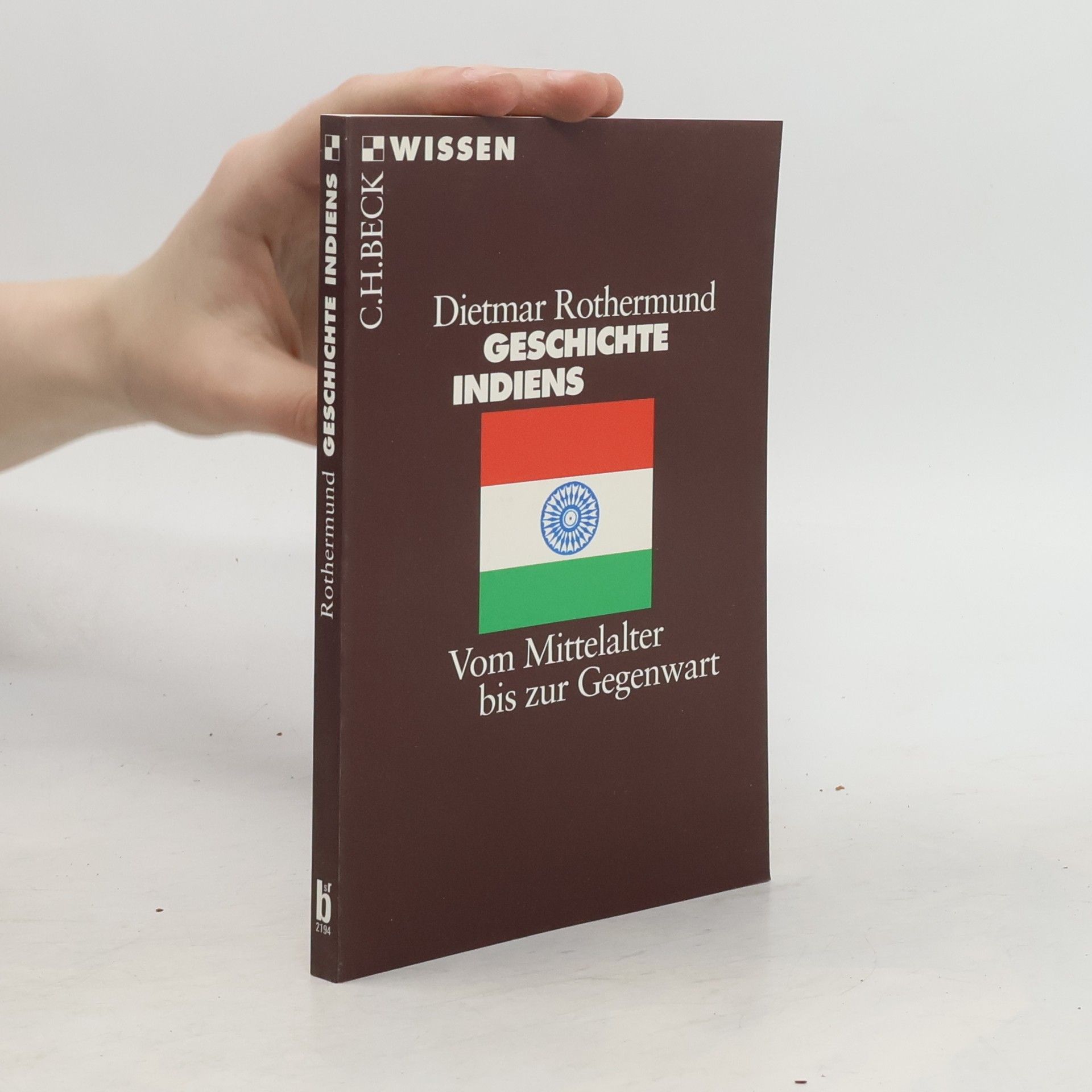Die faszinierende Geschichte des indischen Subkontinents wird von der geheimnisvollen Induskultur bis zur größten Demokratie der Welt beleuchtet. Die umfassende Darstellung ermöglicht ein tiefes Verständnis für die vielfältigen Aspekte des Landes, in dem alte Traditionen, soziale Gegensätze und moderne Technologien harmonisch koexistieren.
Dietmar Rothermund Book order (chronological)



![5mal [Fünfmal] Indien](https://rezised-images.knhbt.cz/1920x1920/69269497.jpg)


Die Idee des gewaltlosen Widerstands ist seit dem indischen Unabhängigkeitskampf mit dem Namen Gandhis verbunden. Durch seine gewaltfreien Aktionen gegen die britische Herrschaft erwarb sich Mahatma Gandhi weit über Indien hinaus Glaubwürdigkeit und Autorität. „Mein Leben ist meine Botschaft“, sagte Gandhi. Diese kompakte Biographie will zum Verständnis seiner Botschaft beitragen.
An authoritative analysis of the political, economic, and social developments behind India’s dramatic rise in global stature With growing economic might, new political influence, and changing social dynamics, India has emerged as a major world power in the twenty-first century. This book charts the important features of India’s development since its independence in 1947, assessing those forces that have contributed to the nation’s growth as well as those that have impeded it. Through the lens of India’s past, Dietmar Rothermund offers a new perspective on India today and a fascinating look into the nation’s future. The author explores the diverse roots of India’s economic robustness, from agriculture to the export boom. He looks closely at the country’s democratic system, nuclear decisions, and alliance with the U.S. against terror. In his review of social changes, Rothermund discusses the institution of caste, the rise of a new middle class, the persistence of poverty, the media and Bollywood, and the significance of the global diaspora of twenty million Indians. In sum, he offers an impressive profile of India, an Asian giant whose role in the world’s future will surely be unique and important.
The Routledge Companion to Decolonization
- 384 pages
- 14 hours of reading
The book offers an in-depth exploration of decolonization across Africa, Asia, the Caribbean, and the Pacific, structured through thematic chapters. It includes a detailed chronology, informative maps, and biographies of significant figures, making it a vital resource for understanding the multifaceted process of decolonization in these regions.
Zum Zeitvertreib: eine wenig beachtete Kategorie der Zeiterfahrung. Der Zeitvertreib erscheint in vielfältigen Formen: als Müßiggang, Spiel, Zerstreuung und Unterhaltung, als Fernsehkonsum oder gar als Grillabend. Im Zeitvertreib eröffnen sich ungewohnte Erfahrungen von Zeit. Sie sind nicht intentional gesteuert, nicht linear und pragmatisch strukturiert, keiner Ökonomie unterworfen, nicht geplant und nicht planbar. Die Beiträge des vorliegenden Bandes fokussieren das Phänomen des Zeitvertreibs aus philosophischer, politischer und künstlerischer Perspektive. Sie untersuchen kulturelle und politische Strategien und fragen nach dem Zeitvertreib in gesellschaftlichen Institutionen, unternehmen Lektüren und betrachten die Bilder des Zeitvertreibs.
Lebensweg Gandhis (1869-1948) anhand entscheidender Stationen; mit einigen Schwarz-Weiss-Abbildungen, Zeittafel und Literatur-Verzeichnis.
Dieter Rothermund schildert in diesem Buch die Geschichte des Kaschmir-Konflikts, der seine Wurzeln in der Teilung Britisch-Indiens im Jahre 1947 hat. Er beschreibt die zunehmende Radikalisierung auf seiten der Hindu-Nationalisten wie der islamischen Fundamentalisten, die immer häufiger zu Terroranschlägen und Progromen führt, und erklärt, warum sich der Konflikt seit dem Anschlag vom 11. September und dem Afghanistan-Krieg weiter verschärft hat.
Geschichte Indiens
- 128 pages
- 5 hours of reading
Zum Buch Indien hat Europäer seit jeher fasziniert – früher hauptsächlich durch seine vielgestaltige Religiosität und fremdartige Kultur, heute fast mehr durch die boomende Software-Industrie. Verständlich wird der indische Subkontinent aber erst vor dem Hintergrund seiner Jahrtausende alten wechselvollen Vergangenheit. Dietmar Rothermund beginnt seine Darstellung der Geschichte Indiens im 6. Jahrhundert, als rivalisierende Regionalreiche das letzte große Gesamtreich des alten Indien ablösten. Er beschreibt die Eroberung dieser Reiche durch islamische Reiterkrieger im Spätmittelalter, die mehr als zwei Jahrhunderte währende glanzvolle Zeit der Mogulkaiser, an die heute noch Bauwerke wie das Taj Mahal erinnern, sowie die Zeit der britischen Kolonialherrschaft. Ein Schwerpunkt liegt auf dem 20. Jahrhundert, in dem das Land in einem langwierigen und dramatischen Freiheitskampf um den Preis der Teilung in die beiden Staaten Indien und Pakistan die Unabhängigkeit errang und schließlich mit mehr als einer Milliarde Einwohnern zur weitaus größten Demokratie der Welt wurde.
Hindistan Tarihi
- 596 pages
- 21 hours of reading
Bu kitap, izleri ve etkileri günümüze kadar gelen Doğu'nun en büyük uygarlıklarından birinin doğup geliştiği bir coğrafyanın tarihidir. Tarıma ve yerleşik kültüre ilk adımın atıldığı bölgelerden olan İndus ve Ganj havzası, aynı zamanda Çin'den Anadolu'ya kadar inanç tarihini doğrudan etkileyen Brahmanizm, Caynacılık ve Buddhizmin doğduğu topraklardır.
Am 15. August 1947 wurde Indien mit einem großen Festakt in Neu-Delhi vom britischen Vizekönig in die Unabhängigkeit entlassen. Zugleich wurde das Land geteilt, und an der neuen Grenze zwischen Indien und Pakistan kam es bald darauf zu blutigen Unruhen. Mahatma Gandhi, der Führer des indischen Freiheitskampfes, wurde Anfang 1948 ermordet. - Die inneren und äußeren Aspekte der Entkolonialisierung in Asien und Afrika sowie Ideologie und Politik der Befreiungsbewegungen bis in die sechziger Jahre.





